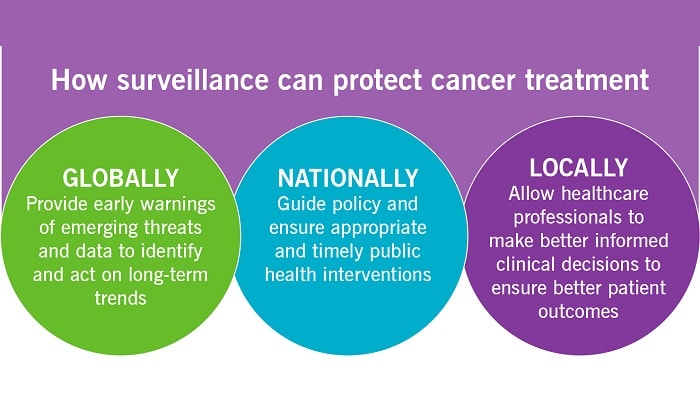Many people believe that getting cancer is purely down to genes. And more than a quarter of people recently surveyed in the UK put it down to fate. While the idea of cancer scares most of us, it seems we are comforted by the thought that there is actually nothing we can do to prevent it.

But are we in denial?
Scientific research has shown that our risk actually depends on a combination of genes, the environment and aspects of our lives, many of which – even though we may not want to – we can control.
In fact, experts have estimated that up to half of all cases of cancer in the UK could be prevented through changes to our lifestyles. Yes – smoking, drinking alcohol, sunburn, eating fatty food and being a TV couch potato are all contributing to cancer risk.
It is never too late for people to make a change. Giving up smoking is the undisputed number one thing we can all do to reduce cancer risk.
But if you cut back on alcohol, slap on factor 15 when on holiday, swap the pastry and puddings for plenty of fruit and vegetables to keep a healthy body weight, and take the stairs instead of the elevator, you will also be doing yourself a favour in the cancer stakes.
Leading a healthy life does not guarantee you won’t get cancer. But healthy living can cut the chances of getting the disease and stack the odds in your favour.
While a small proportion of cancers are caused by inherited genes, most are triggered by DNA damage that accumulates during a person’s lifetime. Damaged DNA can make cells grow and divide uncontrollably – the hallmark of all cancers.
In many cases, healthy living will help reduce cancer risk by reducing exposure to things that damage DNA. Like poisons in cigarette smoke, chemicals produced by the body after drinking too much alcohol and ultraviolet radiation in sunlight and sunbeds.
Smoking
The links between smoking and cancer are now very clear. Smoking is the single biggest cause of cancer in the world, and accounts for one in four UK cancer deaths.
Thanks to research, health campaigns and new policies, the number of smokers in the UK has halved in the last 50 years. Because of this, the number of people who die from lung cancer has also halved. No one can dispute that giving up smoking saves lives.
But there is still a long way to go. Worryingly, there are signs that the number of people who are quitting smoking is starting to match the number who are taking it up.
So what can be done about it? New policies will play a crucial role in determining how we can prevent smoking-related cancers in future generations.
Tobacco advertising has been banned on television, in print and on billboards. Yet children are still regularly exposed to seductive branding on packs and attractive tobacco displays in shops. Without the power of advertising the tobacco industry is making the pack the hero.
Cancer Research UK is urging the government to ban tobacco from public view and introduce plain packaging. This will help to reduce the powerful pull towards a potentially deadly addiction.
Screening
Cervical screening is a way of preventing cervical cancer. It is used to find early changes in the cells lining the cervix that could develop into cervical cancer. Treating these changes can prevent cervical cancer from developing altogether.
The new human papillomavirus (HPV) vaccine is an exciting development and could prevent around 70 per cent of cases of cervical cancer in the future. But we don’t yet know if the vaccine works in women who already have HPV, nor how long the immunity given by the vaccine lasts.
So, for the moment, going for cervical screening (smear test) is still the best way of preventing cervical cancer.
Cancer Research UK experts are investigating whether it would be effective to make HPV testing routinely available on the NHS for women with borderline smear tests. This might help determine whether they should have treatment for these cell changes. If the results of the trials show that HPV testing is effective, it could be given alongside screening, or even replace it.
Bowel cancer screening is used to spot bowel cancer earlier. But it can also help to prevent bowel cancer by finding, and removing, pre-cancerous growths or polyps that could develop into full-blown cancer if they were left alone. The bowel cancer screening programme is being rolled out across England and Wales for men and women aged between 60 and 69, and for people between 50 and 74 in Scotland.
Hormone therapies for breast cancer
Cancer Research UK is not just working on treatments for those with cancer. The charity is also working on treatments to help prevent cancer in those who are at an increased risk. A Cancer Research UK-funded clinical trial looked into using a hormone therapy called tamoxifen to prevent breast cancer in post-menopausal women at high risk of getting the disease. This trial, called IBIS 1, found that the number of breast cancer cases was lowered by a third in the group of women taking tamoxifen to try to prevent breast cancer. IBIS 2 – the second trial from this study – is looking at using another hormone treatment – anastrazole to prevent breast cancer. And early results have been promising.
Is cancer prevention the future of cancer research?
More people are surviving cancer than ever before and better treatments will undoubtedly save more lives in the future. But because cancer is such a complex disease, there will never be one single cure.
In time, experts agree, treatment will have evolved to allow patients to live comfortably with cancer rather than die of the disease.
So prevention and treatment tailored to individuals will continue to play a crucial part in the fight against cancer for decades to come.


















